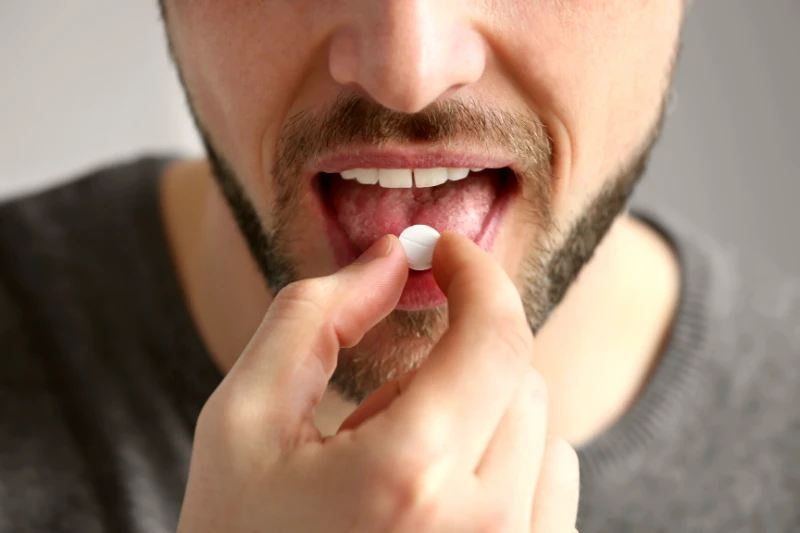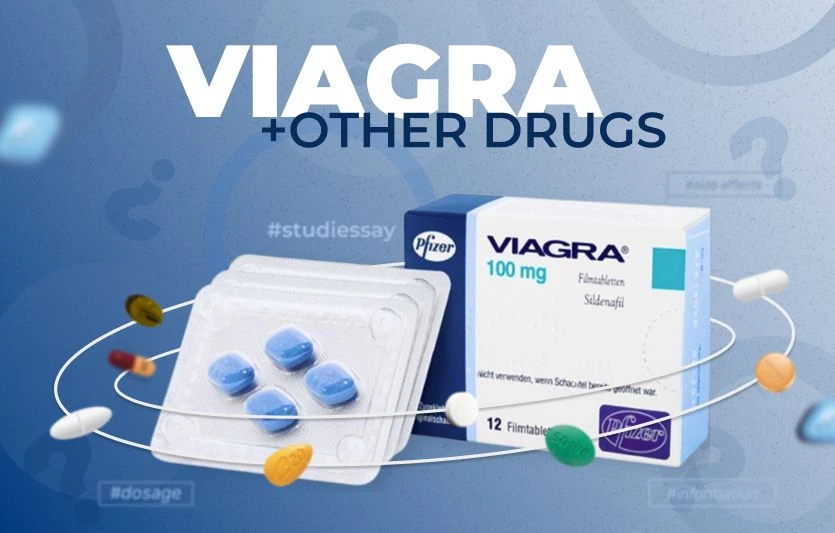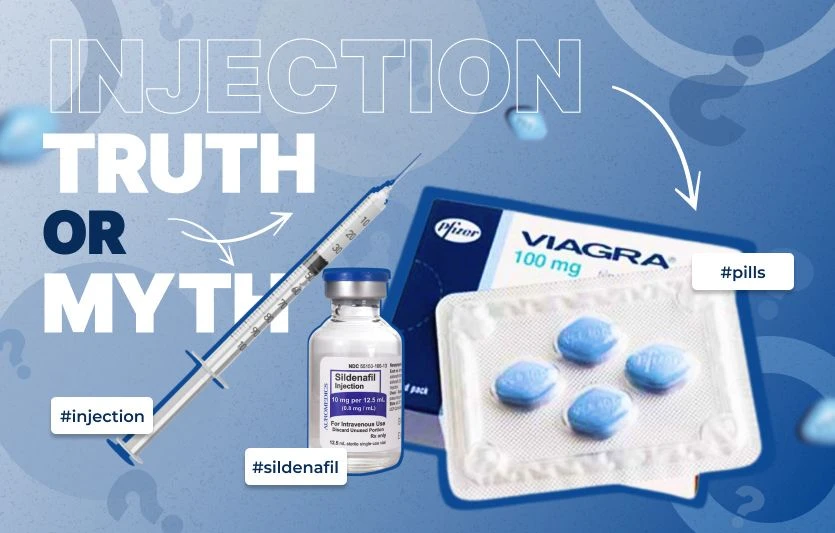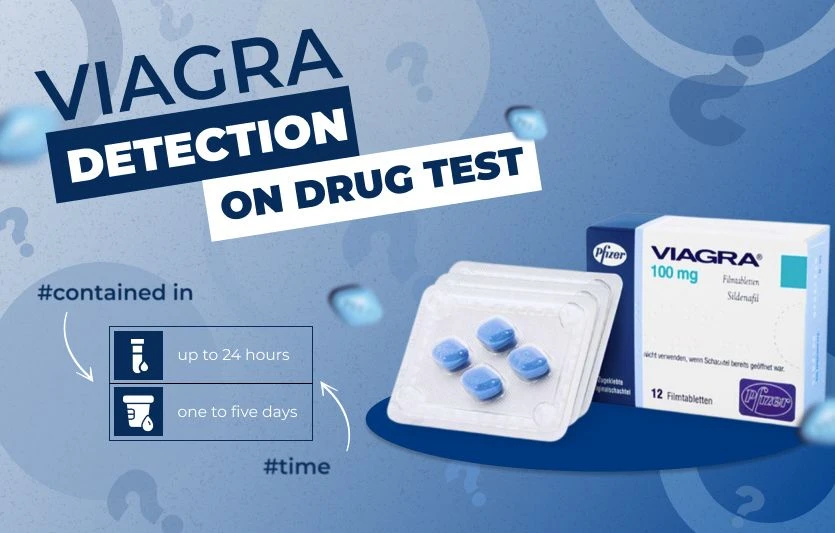Brand Name: Revatio, Viagra, Vizarsin
Generic Name: Sildenafil (sil-DEN-ə-fil)
Drug classes: Agents for pulmonary hypertension, Erectile dysfunction agents
Chemical Formula: C22H30N6O4S
What is sildenafil?
Sildenafil is a prescription drug. It comes in the form of a tablet and suspension (liquid). Both are taken by mouth. It also comes in an intravenous (IV) form, which is only given by a doctor.
Sildenafil oral tablet is available as the brand-name drugs Viagra and Revatio. It’s also available as a generic drug. Generic drugs usually cost less than the brand-name version. In some cases, they may not be available in every strength or form as the brand-name drug.
Why it’s used
Sildenafil oral tablet is used to treat ED and PAH. Generic oral tablets are available for both conditions, but the brand-name drugs each treat only one of the conditions.- Viagra: This drug is used to treat ED. With ED, you’re unable to get or maintain an erection.
- Revatio: This drug is used to treat PAH. With PAH, the blood pressure in your lungs is too high. Your heart has to work very hard to pump blood into your lungs.
How it works
Sildenafil belongs to a class of drugs called phosphodiesterase type 5 (PDE5) inhibitors. A class of drugs is a group of medications that work in a similar way. These drugs are often used to treat similar conditions.Sildenafil works in different ways, depending on the condition it’s being used to treat.- For ED: Sildenafil works by increasing blood flow to the penis. This helps you get or maintain an erection. Sildenafil only works for ED if you’re sexually aroused.
- For PAH: Sildenafil works by relaxing the muscles and opening up the blood vessels in your lungs. This decreases the blood pressure in your lungs. Sildenafil slows down the progression of your illness. It also makes you more able to exercise.
Why is this medication prescribed?
Viagra treats erectile dysfunction (erectile dysfunction) in men. Sildenafil (Revatio) improves exercise in persons with PAH (PAH; high blood pressure in the vessels carrying blood to the lungs, causing shortness of breath, dizziness, and tiredness). Children shouldn’t take sildenafil (Revatio); however, in rare instances, a doctor may prescribe it. Sildenafil belongs to the PDE inhibitor class. Sildenafil boosts blood flow to the penis during sexual stimulation. This blood rush might create an erection. Sildenafil eases blood flow by relaxing lung blood arteries.
If you’re using sildenafil for erectile dysfunction, remember that it doesn’t cure or boost sexual desire. Sildenafil does not prevent pregnancy or HIV transmission (HIV)
Color: white coloured round film coated tablet
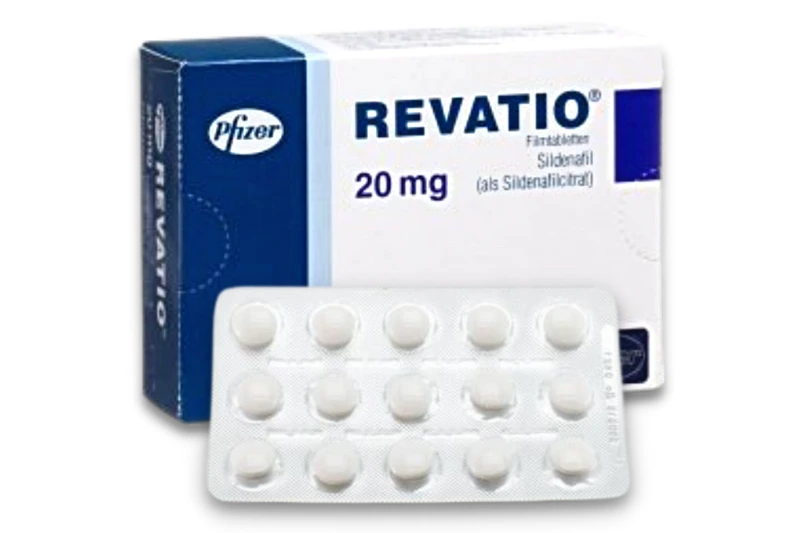
Color: blue coloured round film coated tablet
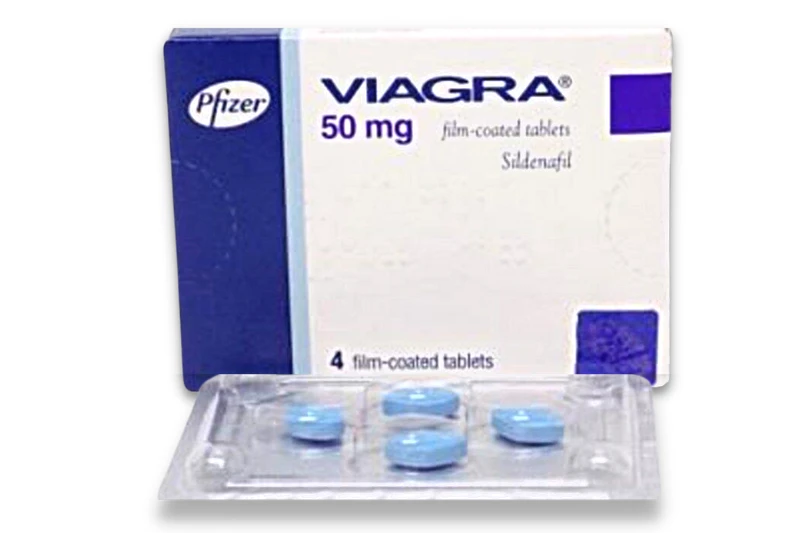
Color: blue coloured round film coated tablet
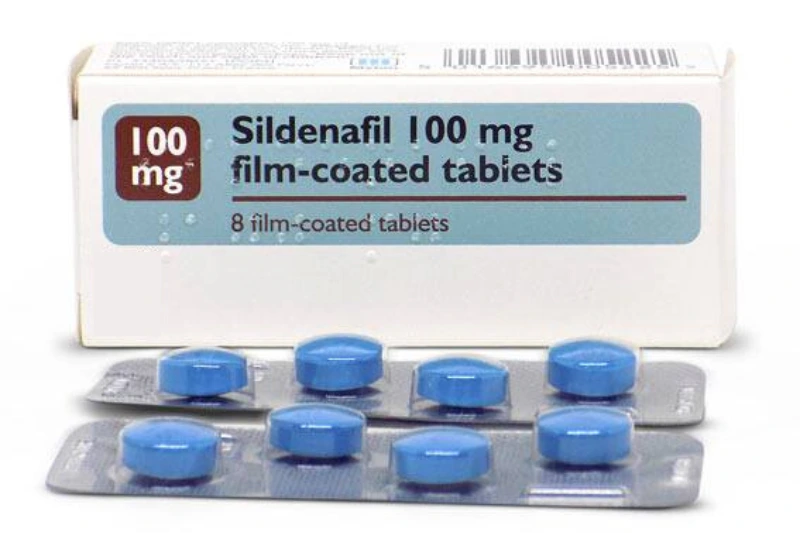
- Priapism warning: This drug can cause priapism, which is an erection that won’t go away. If you have an erection that lasts more than 4 hours, call 911 or go to the nearest emergency room. If it’s not treated right away, this condition can cause permanent damage to your penis.
- Sudden vision loss warning: This drug can cause sudden vision loss in one or both eyes. This can be a sign of a serious eye problem. If this occurs, stop taking sildenafil and call your doctor right away.
- Sudden hearing loss warning: This drug can cause hearing loss, tinnitus (ringing in your ears), or dizziness. If you have sudden hearing loss with or without tinnitus or dizziness, stop taking sildenafil and call your doctor right away.
- Use in children warning: Children generally should not take sildenafil; however, there are instances where the drug is considered the best treatment option. Talk with your child’s doctor to better understand the benefits and risks associated with this treatment option.
How should this medicine be used?
Sildenafil is an oral pill and liquid (Revatio).
Follow your doctor’s instructions if you’re taking sildenafil for erectile dysfunction. Sildenafil is ideally taken 1 hour before sexual activity, although it may be taken up to 4 hours beforehand. Sildenafil is normally taken once a day. Certain health problems or drugs may need you to take sildenafil less regularly. You may take the drug w ith or without meals. Sildenafil takes longer to function after a high-fat diet.
Follow your doctor’s advice if you’re taking sildenafil for PAH. Take it t hree times a day, with or without meals. One more recommendation is t aking sildenafil daily, 4 to 6 hours apart.
Ask your doctor or pharmacist to clarify any directions you don’t understand. Follow sildenafil’s instructions. Take exactly as directed by your doctor.
Before each usage, shake the drug for 10 seconds. Measure your dosage using the oral syringe supplied. Use and clean the oral syringe as directed. Do not mix or flavor the liquid medicine.
If you’re taking sildenafil for erectile dysfunction, your doctor may start you on a low dosage and raise it as needed. If sildenafil isn’t functioning or causing adverse effects, see your doctor.
Sildenafil regulates PAH but doesn’t cure it. Even if you feel well, keep taking sildenafil. Consult your doctor before stopping sildenafil.
Before using sildenafil, read the Patient Information Leaflet from your pharmacist. Consult your doctor or pharmacist.
Take the drug orally as advised by your doctor to treat erectile dysfunction-ED. The recommended timing is 30 minutes to 4 hours before sexual activity (1 hour before is the most effective). Take sidenafil only once a day.
A high-fat meal may slow medication action.
Dosage depends on medical condition, treatment response, and concomitant drugs. Tell your doctor and pharmacist what you’re using (including prescription drugs, nonprescription drugs, and herbal products).
Sildenafil can be used as early as 4 hours before sex and as late as 30 minutes before sex. However, it is recommended to use this drug within an hour before sex.
Sildenafil should not be taken for ED more than once in a 24-hour period. But if you have certain medical conditions or are taking other drugs, your doctor may recommend that you take this drug less often than once a day.
Sildenafil can be taken with food or without food. It is important to note that certain foods, particularly foods high in fat, can cause the drug to work more slowly than normal.
Dosage for erectile dysfunction (ED)
Generic: Sildenafil
- Form: oral tablet
- Strengths: 25 mg, 50 mg, 100 mg
Brand: Viagra
- Form: oral tablet
- Strengths: 25 mg, 50 mg, 100 mg
Adult dosage (ages 18–64 years)
- Typical dosage: 50 mg, taken as needed about 1 hour before sexual activity. It can be taken 30 minutes to 4 hours before sexual activity.
- Maximum dosage: 100 mg once per day.
Child dosage (ages 0–17 years). This medicine isn’t safe or effective for children under 18.
Senior dosage (ages 65 years and older). Seniors’ kidneys, liver, and heart may not operate as effectively. This slows medication metabolism. A bigger medicine dose remains in your body longer. This increases side-effects. Doctors may reduce sildenafil dosages. This helps avoid drug buildup.
Dosage for pulmonary arterial hypertension (PAH)
Generic: Sildenafil- Form: oral tablet
- Strengths: 20 mg
- Form: oral tablet
- Strengths: 20 mg
- Typical dosage: 5 or 20 mg, taken three times per day about 4 to 6 hours apart
- Maximum dosage: 20 mg, taken three times per day about 4 to 6 hours apart
Take as directed
Sildenafil oral tablet treats ED and PAH. Not taking it as recommended has considerable risks. If you stop taking the drug suddenly or don’t take it at all:- For ED: Your ED symptoms won’t improve.
- For PAH: Your condition won’t improve and may get worse. Also, you won’t be able to exercise.
- For ED: Your ED symptoms won’t improve.
- For PAH: This medication may not work as well or may stop working completely. A certain amount of the drug must be in your body at all times to function well.
- low blood pressure
- fainting
- dizziness
- vision problems
- hearing problems
- upset stomach
- chest pain
- For ED: Take your dose 30 minutes to 4 hours before your next sexual activity.
- For PAH: Take your dose as soon as you remember. If you recall hours before your next dosage, take just one. Never double dose to catch up. This may have side effects.
- For ED: You should be able to get and maintain an erection when sexually aroused.
- For PAH: You should be able to exercise more easily. Your doctor will also check you to determine if this drug is working.
What special precautions should I follow?
Before taking sildenafil, tell your doctor and pharmacist if you’re allergic to sildenafil, other drugs, or sildenafil components. Get the ingredients from your pharmacist.
Riociguat (Adempas) or nitrates (chest pain drugs) such as isosorbide dinitrate (Isordil), isosorbide mononitrate (Monoket), and nitroglycerin should not be used with sildenafil (Minitran, Nitro-Dur, Nitromist, Nitrostat, others). Tablets, sublingual tablets, sprays, patches, pastes, and ointments contain nitrates. Whether you’re unsure if your prescriptions include nitrates, ask your doctor.
Do not use nitrate-containing medications (‘poppers’) when taking sildenafil.
Tell your doctor and pharmacist what drugs, vitamins, and supplements you use or intend to take. Mention these: alpha blockers such alfuzosin (Uroxatral), doxazosin (Cardura), prazosin (Minipress), tamsulosin (Flomax, in Jalyn), and terazosin; amlodipine (Norvasc, in Amturnide, in Tekamlo); itraconazole (Onmel, Sporanox) and ketoconazole (Nizoral); anticoagulants like warfarin (Rifadin, Rimactane, in Rifamate, in Rifater). Your doctor may modify your drug dosage or check adverse effects. Many other medicines may interfere with sildenafil, so inform your doctor about all the drugs you use.
If you smoke, have had a long-lasting erection, or have lost a lot of fluids (dehydration), notify your doctor. This might happen if you have fever, diarrhoea, or vomiting, sweat a lot; or don’t drink enough. Tell your doctor if you have or have ever had:
- pulmonary veno-occlusive disease (PVOD; lung vein blockage),
- a stomach ulcer,
- heart, kidney, or liver disease,
- a heart attack,
- an irregular heartbeat,
- a stroke,
- chest pain,
- high or low blood pressure,
- high cholesterol,
- a bleeding disorder,
- blood circulation problems,
- blood cell problems such as sickle cell anaemia,
- multiple myeloma,
- leukaemia.
Tell your doctor if you or a family member has retinitis pigmentosa (a hereditary eye disorder that causes vision loss) or if you have ever experienced abrupt severe vision loss, particularly if you were told it was caused by a restriction of blood flow to the nerves that help you see.
Taking sildenafil to treat PAH while pregnant, nursing, or planning to become pregnant? Tell your doctor. If pregnant while using sildenafil, see a doctor.
Tell your doctor or dentist you’re taking sildenafil before surgery, including dental.
If you’re taking sildenafil for erectile dysfunction, notify your doctor if you’ve been told to avoid sexual activity or if you’ve had chest discomfort during sex. If you have heart problems, sexual activity may strain your heart. Contact your physician if you develop chest discomfort, dizziness, or nausea during sexual activity.
If you require emergency cardiac care, doctors must know when you last took sildenafil.
What should I do if I forget a dose?
If you are taking sildenafil for erectile dysfunction, you are unlikely to miss a dose since this medication is taken as needed, not on a regular dosing schedule.
If you are taking sildenafil for PAH, take the missed dose as soon as you remember it. However, if it is almost time for the next dose, skip the missed dose and continue your regular dosing schedule. Do not take a double dose to make up for a missed one.
In case of emergency/overdose
In case of overdose, call the poison control helpline at 1-800-222-1222. Information is also available online at https://www.poisonhelp.org/help. If the victim has collapsed, had a seizure, has trouble breathing, or can’t be awakened, immediately call emergency services at 911.
Allergies
Tell your doctor if you have ever had any unusual or allergic reaction to this medicine or any other medicines. Also tell your health care professional if you have any other types of allergies, such as to foods, dyes, preservatives, or animals. For non-prescription products, read the label or package ingredients carefully.
Pregnant or planning a pregnancy?
You should seek advice from your doctor or pharmacist about taking this medicine. They can help you balance the risks and the benefits of this medicine during pregnancy.
Drug Interactions
Although certain medicines should not be used together at all, in other cases two different medicines may be used together even if an interaction might occur. In these cases, your doctor may want to change the dose, or other precautions may be necessary. When you are taking this medicine, it is especially important that your healthcare professional know if you are taking any of the medicines listed below. The following interactions have been selected based on their potential significance and are not necessarily all-inclusive.
| Not recommended | Not recommended, but may be required in some cases | May cause an increased risk of certain side effects | Other Interactions |
|---|---|---|---|
| Amprenavir Amyl Nitrite Atazanavir Boceprevir Cobicistat Darunavir Erythrityl Tetranitrate Fosamprenavir Indinavir Isosorbide Dinitrate Isosorbide Mononitrate Levoketoconazole Lopinavir Molsidomine Nelfinavir Nirmatrelvir Nitroglycerin Nitroprusside Pentaerythritol Tetranitrate Propatyl Nitrate Riociguat Ritonavir Saquinavir Telaprevir Tipranavir | Belzutifan Cannabis Ceritinib Clarithromycin Conivaptan Dihydrocodeine Duvelisib Fedratinib Fexinidazole Fluconazole Fosnetupitant Idelalisib Itraconazole Ivosidenib Larotrectinib Lefamulin Lorlatinib Lumacaftor Nefazodone Netupitant Pacritinib Simeprevir Telithromycin Vericiguat Voriconazole | Alfuzosin Bosentan Bunazosin Ciprofloxacin Delavirdine Doxazosin Erythromycin Etravirine Ketoconazole Moxisylyte Nebivolol Prazosin Rifapentine Silodosin Tamsulosin Terazosin Trimazosin | Alcohol Tobacco Grapefruit Juice Pomelo Juice |
Certain medicines should not be used at or around the time of eating food or eating certain types of food since interactions may occur. Using alcohol or tobacco with certain medicines may also cause interactions to occur. The following interactions have been selected on the basis of their potential significance and are not necessarily all-inclusive.
Interactions that increase your risk for side effects
Taking sildenafil with certain medications raises your risk for side effects from sildenafil. This is because the amount of sildenafil in your body is increased. Examples of these drugs include:
- Certain antibiotics, such as clarithromycin or erythromycin.
- Increased side effects can include low blood pressure, dizziness, or vision problems. They can also include erections that last longer than normal.
- Certain antifungals, such as ketoconazole or itraconazole.
- Increased side effects can include low blood pressure, dizziness, or vision problems. They can also include erections that last longer than normal.
Side effects from other drugs: Taking sildenafil with certain medications raises your risk for side effects from these drugs. Examples of these drugs include:
- Alpha-blockers, such as terazosin, tamsulosin, doxazosin, alfuzosin, or silodosin.
- Increased side effects can include a drop in blood pressure, or fainting.
- Blood pressure drugs, such as amlodipine.
- Increased side effects can include blood pressure that’s too low.
- Other drugs for erectile dysfunction, such as avanafil, tadalafil, or vardenafil.
- Increased side effects can include low blood pressure or erections that last longer than normal
| Less common | Rare | More common |
|---|---|---|
Bladder pain | Abnormal vision anxiety behavior change similar to drunkenness bleeding of the eye blurred vision bone pain breast enlargement chest pain chills cold sweats confusion convulsions (seizures) cool and pale skin deafness or hearing loss decrease in amount of urine or the frequency of urination decreased vision difficulty in concentrating dizziness or lightheadedness, especially when getting up suddenly from a lying or sitting position double vision drowsiness dry eyes dry mouth dryness, redness, scaling, or peeling of the skin excessive hunger eye pain fainting or faintness fast, irregular, or pounding heartbeat feeling of something in the eye fever or chills headache (severe or continuing) increase in the size of the pupil increased sweating increased thirst lower back or side pain migraine headache nausea (severe or continuing) nervousness nightmares numbness of the hands painful, swollen joints prolonged, painful erection of penis redness, burning, or swelling of the eyes redness, itching, or tearing of the eyes restless sleep seeing shades of colors differently than before sensitivity to light shakiness skin lesions with swelling skin paleness skin rash, hives, or itching skin ulcers slurred speech sore throat sudden weakness swelling of the face, hands, feet, or lower legs trouble breathing twitching of the muscles unusual feeling of burning or stinging of the skin unusual tiredness or weakness vision changes vision loss, temporary Incidence not known Blindness | Aches or pains in the muscles |
More common side effects may occur that usually do not need medical attention. These side effects may disappear during treatment as your body adjusts to the medicine. Also, your health care professional may be able to tell you about ways to prevent or reduce some of the side effects. Check with your health care professional if any of the following side effects continue or are bothersome or if you have any questions about them.
Other side effects not listed may also occur in some patients. If you notice any other effects, check with your healthcare professional.
Call your doctor for medical advice about side effects. You may report side effects to the FDA at 1-800-FDA-1088.
What other information should I know?
Keep all appointments with your doctor.
Do not let anyone else take your medication. Ask your pharmacist any questions you have about refilling your prescription.
It is important for you to keep a written list of all of the prescription and nonprescription (over-the-counter) medicines you are taking, as well as any products such as vitamins, minerals, or other dietary supplements. You should bring this list with you each time you visit a doctor or if you are admitted to a hospital. It is also important information to carry with you in case of emergencies.
References
- NCP Medicinewise. Australian Prescriber. Sildenafil citrate [1 October 1998]. Available from: [URL Link]
- MedlinePlus. National Library of Medicine. Sildenafil [Last Revised – 01/15/2018]. Available from: [URL Link]
- WebMD. Sildenafil Tablet – Uses, Side Effects, and More. Available from: [URL Link]
- Mayo Clinic. Drugs and Supplements: Sildenafil. Description and Brand Names. Available from: [URL Link]
- DrugBank Online. Sildenafil: Uses, Interactions, Mechanism of Action. Available from: [URL Link]
- Healthline. Sildenafil (Oral Tablet): Side Effects, Dosage, Uses, and Review [Reviewed by Alan Carter, Pharm.D. on May 17, 2021]. Available from: [URL Link]
- NCBI. Onset and duration of action of sildenafil for the treatment of erectile dysfunction. Available from: [URL Link]
- Healthdirect. Free Australian health advice you can count on. Sildenafil (Generic Health). Available from: [URL Link]
- Cleveland Clinic. Sildenafil Tablets (Erectile Dysfunction). Available from: [URL Link]
- Drugs.com. Sildenafil: Usage, Dosage & Side Effects. [Reviewed by Kaci Durbin, MD]. Available from: [URL Link]
- Medscape. Sildenafil (Rx). Revatio, Viagra (sildenafil). Dosing, Indications, Interactions. Available from: [URL Link]
Disclaimer
Australiagra info isn’t for emergencies. Call triple zero (000) if you have an acute sickness, overdose, or emergency.
When created, correct information was provided. This material shouldn’t be used to replace medical advice, diagnosis, or treatment. Please see our terms and conditions.

